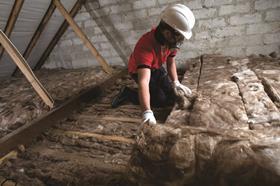A cross-party panel of MPs and experts describes flagship energy saving scheme as ‘financially unattractive’ and ‘overly complicated’

A cross-party panel of MPs and experts has echoed Building’s call for the government to introduce long-term incentives for the Green Deal to boost the faltering retrofit scheme.
The report, by an expert panel set up by the All Party Parliamentary Group for Excellence in the Built Environment, also warned that the Green Deal “may not be strong enough to be a significant influence in meeting the UK’s carbon emissions targets”. It added: “Financially, the Green Deal is unattractive and uncompetitive. It is overly complicated and it doesn’t work for social housing organisations.”
The panel said it was concerned that the Green Deal and its sister scheme the Energy Companies Obligation (ECO), would actually deliver reductions in carbon emissions slower than the two schemes they replaced in January, the Carbon Emission Reduction Target (CERT) and the Community Energy Saving Programme (CESP).
It said only a surge in energy prices could make the Green Deal attractive enough to gain momentum in the marketplace.
The report said the government should consider introducing additional incentives, including stamp duty and council taxes linked to energy efficiency in order “galvanise the Green Deal take-up”.
Building’s Green for Growth campaign has also called for the government to boost the Green Deal through greater incentives.
The panel, chaired by Conservative MP Oliver Colvile and including industry leaders such as former Olympic Delivery Authority chair Sir John Armitt and BRE chief executive Peter Bonfield, said stronger focus on local initiatives was needed and that the scheme as a whole had to be simplified. It also said the government should seek to underwrite the finance for the Green Deal as a way of lowering the interest rate under the scheme.
Writing in the report, Colvile said: “Ultimately, the success or failure of the Green Deal depends on political will and strong leadership.
“We hope this report sends a clear message to government to reaffirm its commitment to the sustainable agenda in construction and the built environment.”
A spokesperson for the Department of Energy and Climate Change admitted there had been “challenges” in getting finance in place to support the Green Deal, but that “providers are increasingly active”. He added that an industry-led provider forum, chaired by Kingfisher Group chief executive Ian Cheshire, was exploring ways to simplify how Green Deal finance works.
Among other recommendations, the report said the Green Construction Board needed to be “given more teeth” to “impact policy” and provide a “focal point for delivery and action”.
Mike Putnam, co-chair of the Green Construction Board and chief executive of Skanska, said the board’s role was “one of leadership and partnership”. Hesaid the Green Construction Board would remain as the vehicle that “can press forward with the green agenda, a central tenet of the industrial [construction] strategy”.
The report’s key recommendations
- Government to set clear short term targets to monitor progress on meeting green ambitions
- Government to be clearer on whether it prioritises lowering fuel bills or saving carbon
- Set up an Existing Homes Hub to drive retrofit of buildings outside of the Green Deal
- Simplify the Green Deal and introduce incentives for take-up
- Revise the Green Deal to make it easier for social landlords to access
- Lower the interest rate for the Green Deal through underwriting the finance for it
























No comments yet